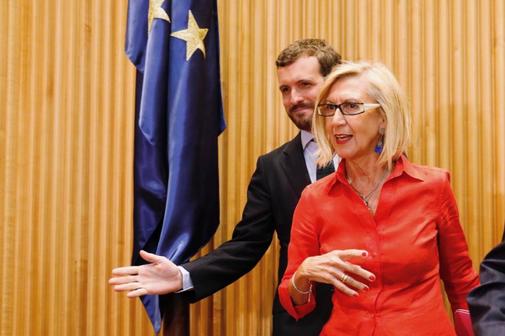The PP has taken to the Congress of Deputies, for the first time, the debate of ideas of Spain Suma, with a constitutional colloquium focused on the defense of the "common" against the divisive attempt of Catalan independence. The great novelty of the act has been the presence, as rapporteur, of the former UPyD leader Rosa Díez, which the popular have tempted to return active politics, within the framework of Spain Sum. She has acknowledged that she "misses" the Congress and has let herself be loved, although she has remembered that she is "social democrat."
The event, organized by the Popular Parliamentary Group, has been attended by members of other parties, such as Cristiano Brown, president of UPyD; Roberto Hernández, deputy of Citizens; and Sergio Sayas, from UPN.
But, after Ten, all eyes have been on Alejo Vidal Quadras. At the end of the event, the former leader of PP and Vox has assured that "this PP" likes "more than Rajoy, who sees that Spain Suma is a good idea and, therefore, do not understand the reticence of Santiago Abascal to attend this act.
At the close of the colloquium, Casado has claimed that "a nation of free and equal citizens is a politically and ethically superior construction to a nation made up of juxtaposition of identities", and that "the Constitution does have material limits" that serve as a parapet against "the combined attack" against "the definition of Spain as a plural nation". That is, against "the autonomous model."
"The Constitution is not the problem. The extremist struggles that seek to erode it pay the best tribute," said the president of the PP.
At that time, Casado has made a mention against the identitarianism that also exists to the right of the PP: "There is no room for a Spanish nationalism opposed to various peripheral nationalisms, because Spain does not need to be built as a nation: it already is."
For Casado, "it is not only about preventing the secession of a territory. It is about preventing the definitive denationalization of Spain" and avoiding that "to satisfy the atavism of a few, the citizens are taken from everyone." The opposition leader has defended the role of the King, who "in recent months has demonstrated once again the responsibility with which he performs his task."
Cayetana Álvarez de Toledo, parliamentary spokesman for the PP, has opened the day with a fiery defense of the unity (also electoral) of the constitutionalists "against the separatist challenge". "The regrouping of the political parties that shared the same thing has not happened. I think it will end up happening, because it is good for Spain", despite the "electoral tricks" of parties like Citizens.
"Rosa Díez has to be in active politics," Álvarez de Toledo has influenced. The former leader of the PSOE and UPyD has wondered who was going to tell her that she would end up participating in an act of a party that named her "scourge", in reference to her belligerent opposition against Mariano Rajoy.
Already in flour, he wanted to make self-criticism: "For many years, we neglect. Today there are no Spaniards who speak in the name of Spain. There are Galicians, Basques ... but not to speak in the name of what belongs to everyone."
The former deputy has assured that if a government "gives in to the blackmail" of the independentistas, "we would go back 40 years towards a less democratic Spain." "In the end we are going to win. We cannot afford not to win. We owe it to our elders and those who carried out the Transition," he said.
Finally, Rosa Díez has assured that she misses Congress. Casado has replied that she is also missed, and Álvarez de Toledo has ordered her to return to active politics
The president of the PP of Catalonia, Alejandro Fernández, has added that the coalition should not only be utilitarian to take advantage of "the recesses of the D'Hondt Law", but also be an instrument to combat "identity nationalism". "It seems that we are losing, but in the end we always win."
In his opinion, the rise of identitarianism also advances regionalism. "There is no intermediate point between individual freedom and the tribe; I have always had the feeling that regionalism confuses politics with governing."
This is a different point of view from other regional leaders of the PP, such as Alfonso Alonso (Basque Country), Isabel Bonig (Valencian Community) or Alberto Núñez Feijóo (Galicia), who have a greater desire for regional accent.
Fernández has criticized that the current government strategy "pastelee" with the independentistas and thereby deactivate any major constitutional alliance in Catalonia. "We are in the era of velocirraptores", in which politicians carry out "fast consumption" policies, with "gurus who are dedicated to manipulate public opinion."
"Everything for the country", the writer and language scholar Álvaro Pombo has begun. The founder of UPyD - which has been defined as "apolitical" - has defended "constitutional patriotism", but not "patriotism of the homelands". He has read a sonnet of Gongoras, 'A Córdoba' ("Oh country, oh flower of Spain!") As an example of love for the small country without falling into nationalism.
According to the criteria of The Trust Project
Know more- PP
- Rosa Diez
- Mariano Rajoy
- Citizens
- Alberto Nunez Feijoo
- UPN
- Vox
- Alfonso Alonso
- Congress of Deputies
- Isabel Bonig
- Cayetana Álvarez de Toledo
- PSOE
InterviewAlfonso Alonso: "Spain Suma is in the media, but there has been no talk within the PP"
Politics The PP invites critics of the PSOE to integrate into Spain Sum
PP Barones reject Casado's offer to Vox to enter Spain Sum

